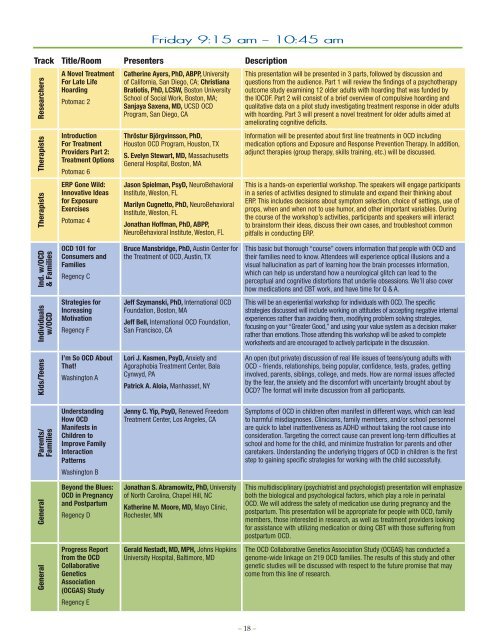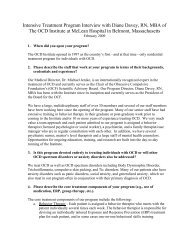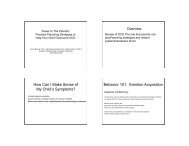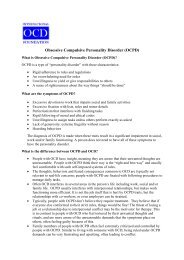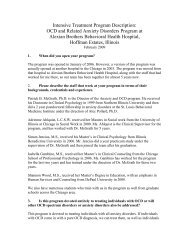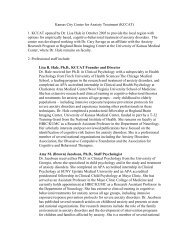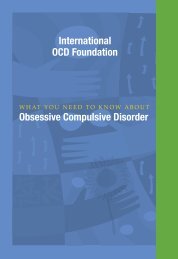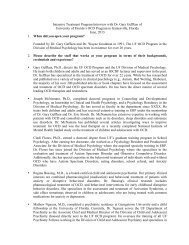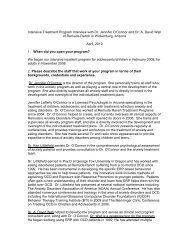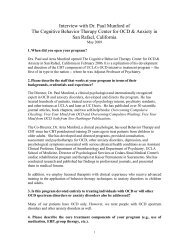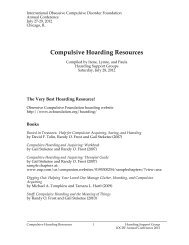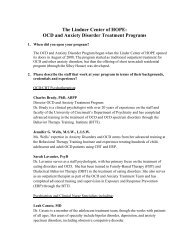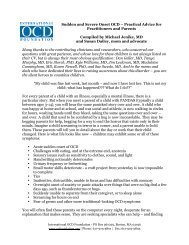Friday 8:00 am â 9:00 am - Obsessive Compulsive Foundation
Friday 8:00 am â 9:00 am - Obsessive Compulsive Foundation
Friday 8:00 am â 9:00 am - Obsessive Compulsive Foundation
You also want an ePaper? Increase the reach of your titles
YUMPU automatically turns print PDFs into web optimized ePapers that Google loves.
<strong>Friday</strong> 9:15 <strong>am</strong> – 10:45 <strong>am</strong>Track Title/Room Presenters DescriptionResearchersTherapistsTherapistsA Novel TreatmentFor Late LifeHoardingPotomac 2IntroductionFor TreatmentProviders Part 2:Treatment OptionsPotomac 6ERP Gone Wild:Innovative Ideasfor ExposureExercisesPotomac 4Catherine Ayers, PhD, ABPP, Universityof California, San Diego, CA; ChristianaBratiotis, PhD, LCSW, Boston UniversitySchool of Social Work, Boston, MA;Sanjaya Saxena, MD, UCSD OCDProgr<strong>am</strong>, San Diego, CAThröstur Björgvinsson, PhD,Houston OCD Progr<strong>am</strong>, Houston, TXS. Evelyn Stewart, MD, MassachusettsGeneral Hospital, Boston, MAJason Spielman, PsyD, NeuroBehavioralInstitute, Weston, FLMarilyn Cugnetto, PhD, NeuroBehavioralInstitute, Weston, FLJonathan Hoffman, PhD, ABPP,NeuroBehavioral Institute, Weston, FLThis presentation will be presented in 3 parts, followed by discussion andquestions from the audience. Part 1 will review the findings of a psychotherapyoutcome study ex<strong>am</strong>ining 12 older adults with hoarding that was funded bythe IOCDF. Part 2 will consist of a brief overview of compulsive hoarding andqualitative data on a pilot study investigating treatment response in older adultswith hoarding. Part 3 will present a novel treatment for older adults aimed at<strong>am</strong>eliorating cognitive deficits.Information will be presented about first line treatments in OCD includingmedication options and Exposure and Response Prevention Therapy. In addition,adjunct therapies (group therapy, skills training, etc.) will be discussed.This is a hands-on experiential workshop. The speakers will engage participantsin a series of activities designed to stimulate and expand their thinking aboutERP. This includes decisions about symptom selection, choice of settings, use ofprops, when and when not to use humor, and other important variables. Duringthe course of the workshop’s activities, participants and speakers will interactto brainstorm their ideas, discuss their own cases, and troubleshoot commonpitfalls in conducting ERP.Ind. w/OCD& F<strong>am</strong>iliesOCD 101 forConsumers andF<strong>am</strong>iliesRegency CBruce Mansbridge, PhD, Austin Center forthe Treatment of OCD, Austin, TXThis basic but thorough “course” covers information that people with OCD andtheir f<strong>am</strong>ilies need to know. Attendees will experience optical illusions and avisual hallucination as part of learning how the brain processes information,which can help us understand how a neurological glitch can lead to theperceptual and cognitive distortions that underlie obsessions. We’ll also coverhow medications and CBT work, and have time for Q & A.Individualsw/OCDStrategies forIncreasingMotivationRegency FJeff Szymanski, PhD, International OCD<strong>Foundation</strong>, Boston, MAJeff Bell, International OCD <strong>Foundation</strong>,San Francisco, CAThis will be an experiential workshop for individuals with OCD. The specificstrategies discussed will include working on attitudes of accepting negative internalexperiences rather than avoiding them, modifying problem solving strategies,focusing on your “Greater Good,” and using your value system as a decision makerrather than emotions. Those attending this workshop will be asked to completeworksheets and are encouraged to actively participate in the discussion.Kids/TeensI’m So OCD AboutThat!Washington ALori J. Kasmen, PsyD, Anxiety andAgoraphobia Treatment Center, BalaCynwyd, PAPatrick A. Aloia, Manhasset, NYAn open (but private) discussion of real life issues of teens/young adults withOCD - friends, relationships, being popular, confidence, tests, grades, gettinginvolved, parents, siblings, college, and meds. How are normal issues affectedby the fear, the anxiety and the discomfort with uncertainty brought about byOCD? The format will invite discussion from all participants.Parents/F<strong>am</strong>iliesUnderstandingHow OCDManifests inChildren toImprove F<strong>am</strong>ilyInteractionPatternsJenny C. Yip, PsyD, Renewed FreedomTreatment Center, Los Angeles, CASymptoms of OCD in children often manifest in different ways, which can leadto harmful misdiagnoses. Clinicians, f<strong>am</strong>ily members, and/or school personnelare quick to label inattentiveness as ADHD without taking the root cause intoconsideration. Targeting the correct cause can prevent long-term difficulties atschool and home for the child, and minimize frustration for parents and othercaretakers. Understanding the underlying triggers of OCD in children is the firststep to gaining specific strategies for working with the child successfully.Washington BGeneralBeyond the Blues:OCD in Pregnancyand PostpartumRegency DJonathan S. Abr<strong>am</strong>owitz, PhD, Universityof North Carolina, Chapel Hill, NCKatherine M. Moore, MD, Mayo Clinic,Rochester, MNThis multidisciplinary (psychiatrist and psychologist) presentation will emphasizeboth the biological and psychological factors, which play a role in perinatalOCD. We will address the safety of medication use during pregnancy and thepostpartum. This presentation will be appropriate for people with OCD, f<strong>am</strong>ilymembers, those interested in research, as well as treatment providers lookingfor assistance with utilizing medication or doing CBT with those suffering frompostpartum OCD.GeneralProgress Reportfrom the OCDCollaborativeGeneticsAssociation(OCGAS) StudyGerald Nestadt, MD, MPH, Johns HopkinsUniversity Hospital, Baltimore, MDThe OCD Collaborative Genetics Association Study (OCGAS) has conducted agenome-wide linkage on 219 OCD f<strong>am</strong>ilies. The results of this study and othergenetic studies will be discussed with respect to the future promise that maycome from this line of research.Regency E– 18 –


